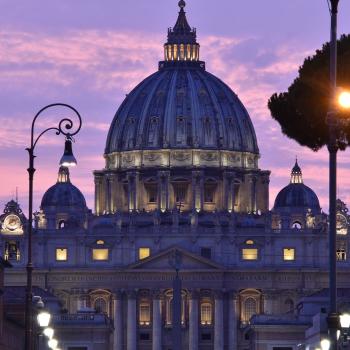In peace and war, the chaplains of the U.S. armed forces minister to the needs of our troops. All too many of them have made the final sacrifice alongside their flocks, and Memorial Day 2011 is a good time to reflect on their faith, their hearts and spirits, and their contributions to the story and meaning of America.
On August 30, 2010, Army Chaplain (Captain) Dale Goetz became the first chaplain to be killed in combat since Vietnam. He was killed, along with four other soldiers, by a roadside bomb in Kandahar province, Afghanistan, where he was serving with the 1-66 Armor Battalion of the 4th Infantry Division. Chaplain Goetz was "FOB-hopping" at the time: traveling in a convoy to remote "forward operating bases" to minister to his soldiers. He was 43 and left behind a wife and three children.
The tributes to Chaplain Goetz at the 1st Armor Brigade's Facebook page are too numerous to select just one or two. But chaplains don't have to be killed in action to win the love, gratitude, and respect of the troops they serve. Many a soldier, sailor, airman, and Marine have strong memories of chaplains who made a profound impact on their lives.
During my Navy career, we tended to call chaplains "Chaps" or "Padre." I knew one female chaplain of maternal aspect, a Presbyterian, whose fellow officers jokingly called her "Reverend Mother." (If you don't like nicknames, don't join the Navy.) Chaplains come in all human varieties, from the naturally cheerful to the dour and intense. And one thing is certain: whenever the troops are facing the most traumatic and devastating events of life, a chaplain gets one of the first calls.
For the dreaded "Amcross" (American Red Cross) notifications—usually about a death in someone's family—the chaplain is summoned. Sailors who have been convicted by court-martial and who face life-altering reckonings with their deeds seek succor in a chaplain's counsel. A soldier being divorced by the spouse back home hangs onto the chaplain's spiritual support as a lifeline. When an airman is on suicide watch, the chaplain is on call. If a Marine commits suicide, the chaplain is there to comfort the living and invoke the healing hand of God on a legacy of sorrow and doubt.
Chaplains can be at their best when they are the most human. On one of my deployments, our carrier air wing lost an F-14 Tomcat and its two crewmen while we were in the Persian Gulf. Both officers were men of excellence, and well liked; the chaplain who conducted their memorial service was a good friend of both. We stood in formation on the flight deck for the service, and we were all holding up pretty well until the chaplain began to recite some of the favorite Bible verses of our fallen shipmates. They are familiar to most Christian military officers: Proverbs 27:17, Psalm 144:1, John 15:13. The chaplain could not get through the first one—"As iron sharpens iron, so one man sharpens another"—without breaking down. He took all of us down with him. And each one of us felt that the commemoration was truer, and the honor done greater, because of it.
Of Father Francis Duffy—a World War I chaplain, and the most decorated in U.S. military history—the website of New York's "Fighting 69th" Infantry Division says this: "The chaplain . . . took on the role of burying the dead, and a soldier remembers him weeping on the battlefield." A journalist described his impact on the front lines in France in 1918:
In the thick of the fighting, cheering on the living, administering the last rites of his Church to the dying, filling the place of a stretcher bearer who had been struck down by a bullet, assisting the wounded, darting hither and yon, a ministering angel truly affording the one human touch and supplying the last link between Christian civilization and the barbarism which is war.
Ministering the grace of spiritual connection and humanity to soldiers in the chaos of war is the task of chaplains. Some have done it under the most remarkable of circumstances, like Chaplain William Eastman, who found himself with the 72nd New York Volunteer Infantry at the battle of Gettysburg in 1863. Eastman's knee was blown out when he was thrown from his horse early in the engagement; he was unable to walk or even crawl. But he managed to reach and comfort the first of many dying soldiers by tucking himself into a ball and rolling toward the man. "For the rest of that night, and into the next day, Chaplain Eastman rolled, or was carried to and fro across the field, to minister to wounded and dying men."





